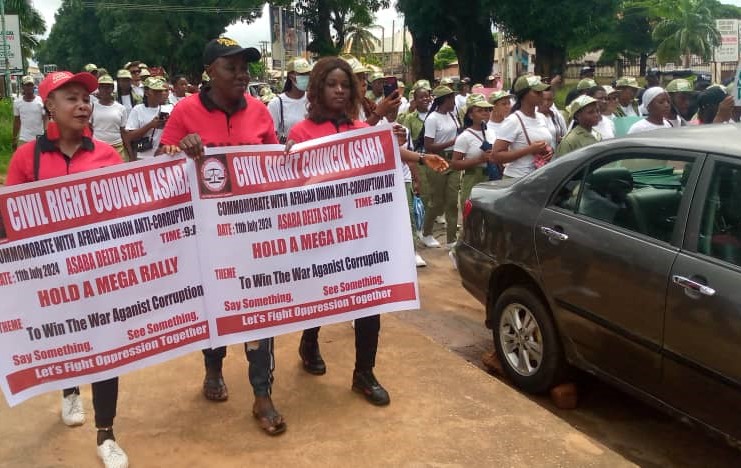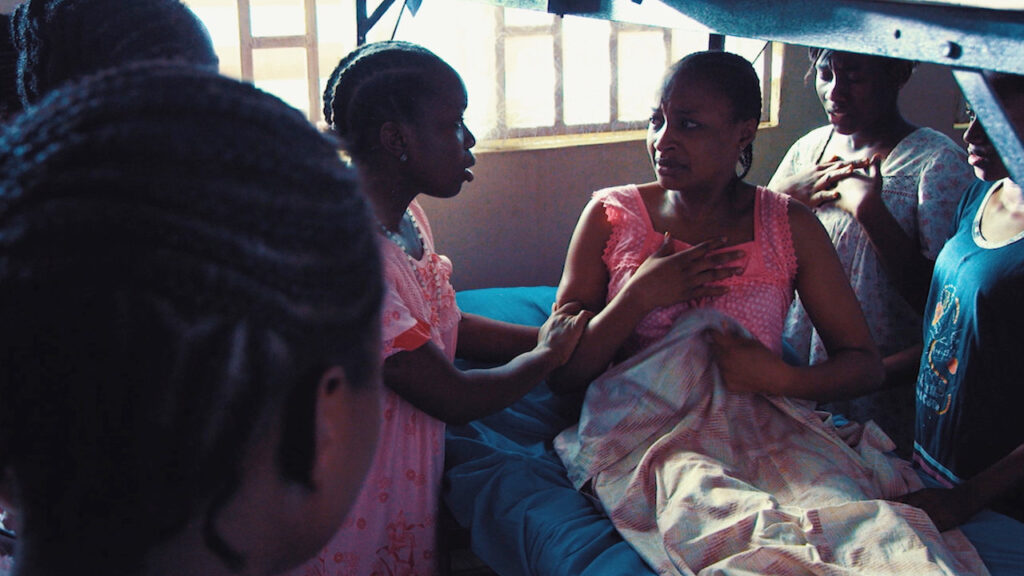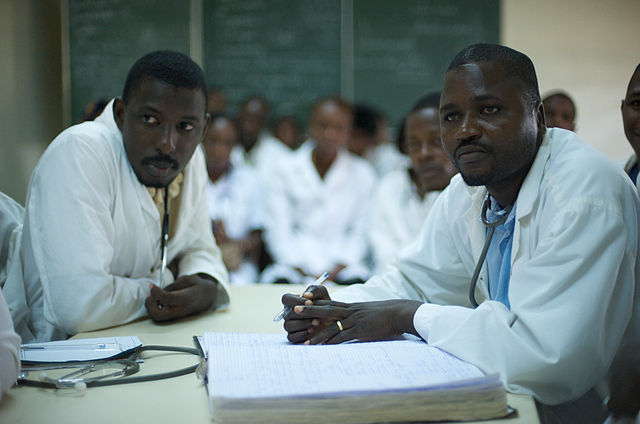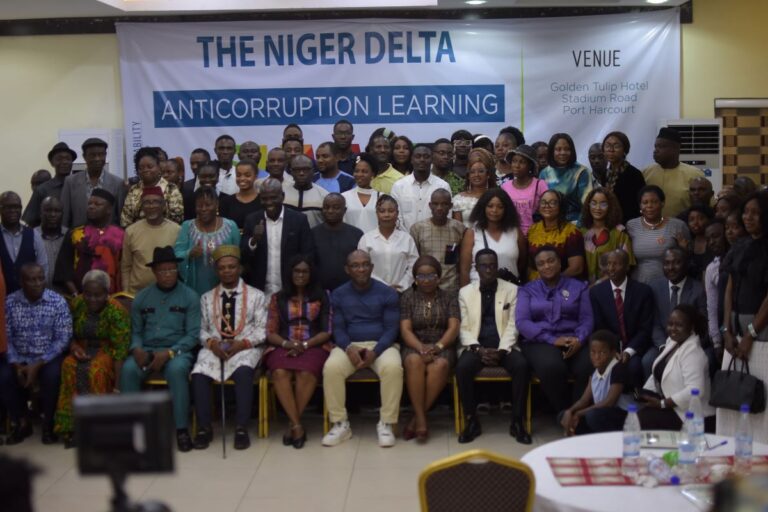Unveiling the Shadow of Corruption, a glance at the Nigeria Health Sector
Corruption has significantly hindered the effectiveness of healthcare delivery in Nigeria. Despite substantial public health expenditures, the impact on reducing epidemic diseases and mortality rates has been minimal. According to reports, the gap between investment and outcomes can largely be attributed to corrupt practices such as fraudulent procurement, misappropriation of funds, and nepotism in healthcare appointments.
Recognizing the need to address this gap, the Civil Rights Council in Delta State, sponsored by Social Action, collaborated with the ICPC and other stakeholders on this year’s African Anti-Corruption Day 2024, themed “Effective Whistleblowers Protection Mechanism: A Critical Tool in the Fight Against Corruption.” The rally served as an avenue to draw attention to the declining health services in the country due to corruption in the sector and to encourage victims to report observed cases to the relevant anti-graft agencies for investigation and prosecution.

Corruption in the Health Sector
Numerous scandals have marred Nigeria’s healthcare landscape, underscoring the pervasive nature of corruption. The infamous Pfizer trovafloxacin trial in Kano, where children suffered life-altering injuries, highlighted regulatory failures and compromised ethical standards due to corruption. Similarly, reports of mismanagement of donor funds for essential therapeutic foods meant for malnourished children further illustrate how corruption directly impacts the most vulnerable.Despite significant international aid directed towards improving healthcare, reports indicate that a large portion of these funds is mismanaged or diverted. The lack of transparency and accountability perpetuates a cycle where external investments fail to translate into tangible health improvements for Nigerian citizens. The practice of Nigerian politicians and public office holders seeking medical treatment abroad has faced significant criticism. This practice contributes to capital flight associated with medical tourism and raises concerns about the adequacy of domestic healthcare services. It also highlights issues of equity in healthcare access and reflects poorly on the state of healthcare infrastructure in the country.
Corruption Among Health Workers
Furthermore, the endemic corruption in Nigeria’s public hospitals is primarily rooted in systemic deficiencies: under-financed and poorly managed systems, inadequate record-keeping, and ineffective monitoring mechanisms. These issues have allowed for widespread practices such as extortion by healthcare workers for services like laboratory tests, drugs, emergency consultations, and even blood donations. Such practices not only increase out-of-pocket costs for patients but also deter many from seeking essential medical care, worsening health disparities across the country.

At the facility level, corruption manifests in various forms, including nepotism and favoritism in appointment bookings and waiting times. This perpetuates a culture of distrust in public healthcare institutions, leading to a loss of confidence among the populace in modern medical facilities. The consequences are dire: compromised patient care, diminished health outcomes, and an overall deterioration of healthcare service delivery.
The Failure of The Nigeria Government
The financial dynamics further aggravate the situation. Despite substantial international donor funds pouring into the sector—such as the Global Fund’s injection of $225 million to combat malaria in 2012—the allocation and management of these resources remain fraught with corruption. Reports indicate that a significant majority of health expenditure in Nigeria is sourced externally, highlighting a dependence on foreign aid to sustain basic healthcare operations.
Government accountability is crucial yet often lacking. Budgetary allocations for healthcare consistently fall short of meeting national needs, ranking among the lowest in Africa. Less than 30% of the allocated budget is effectively released and utilized, with independent assessments highlighting widespread mismanagement and corruption in expenditure practices.
The impact on health human resources is profound. Corrupt management practices and demotivated personnel contribute to low productivity, frequent strikes, and poor uptake of public health facilities. Doctors, nurses, and other healthcare professionals are sometimes complicit in fraudulent activities, including theft of public resources, bribery, and various forms of indiscipline, further eroding the integrity of healthcare provision.
The correlation between corruption levels, as measured by Transparency International’s Corruption Perception Index (CPI), and life expectancy underscores the severity of the issue. From 1999 to 2011, as corruption perceptions worsened, life expectancy at birth stagnated or declined in Nigeria, reflecting the systemic failures and mismanagement within the healthcare sector.
The deep-rooted corruption within Nigeria’s healthcare system is a critical barrier to achieving meaningful health outcomes for its citizens. Despite substantial international aid, the lack of effective governance, accountability, and transparency continues to undermine efforts to improve healthcare delivery. Addressing these challenges requires comprehensive reforms, including strengthened regulatory frameworks, enhanced financial oversight, and renewed efforts to combat corruption at all levels of the healthcare system. Only through sustained and concerted efforts can Nigeria hope to provide equitable, accessible, and effective healthcare services to its population.

The Call to Action: Anti-Corruption Africa Day
The Anti-Corruption Africa Day 2024 served as a rallying point to renew commitments towards eradicating corruption. The day which was marked on July 11, 2024, Social Action and its initiative, the Civil Rights Council (CRC), observed Anti-Corruption Africa Day with the theme “Effective Whistleblowing for a Corruption-Free Nigeria.” This day, commemorated annually since the adoption of the African Union Convention on Preventing and Combating Corruption, serves as a platform to reflect on anti-corruption strategies and renew the commitment to eradicating corruption across the continent. The event in Asaba featured a march led by CRC and other stakeholders, highlighting the need for effective whistleblowing as a tool in the fight against corruption. Joy Edigbine, the Asaba Unit Coordinator, emphasized the importance of citizen involvement in reporting corrupt activities particularly in the health care service where a lot of avoidable deaths have been recorded mainly due to corruption. Her call to action—“If you see something, you must say something”—underscored the critical role of public vigilance in tackling corruption. She described corruption as a major setback to national progress in the health sector and stressed that combating it is a collective responsibility. The idea of whistleblowing is not synonymous only to financial crime as most people would assume but also keeping quiet in the face of corrupt practices and it is a course to call out those involved in these practices.
The ongoing efforts to combat corruption in Nigeria require sustained engagement from all sectors of society. The Civil Rights Council, alongside Social Action and other stakeholders have been playing crucial roles in this endeavor. By participating in events like Anti-Corruption Africa Day and advocating for transparency and accountability, these organizations help to create a more informed and active citizenry.
Conclusion
In conclusion, corruption continues to impede Nigeria’s progress towards achieving sustainable development goals, particularly in healthcare. The endemic nature of corruption not only undermines public trust but also jeopardizes the health and well-being of millions. As stakeholders intensify efforts to combat corruption, there is a renewed hope that transparency, accountability, and ethical governance will pave the way for a healthier Nigeria.




